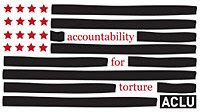At its September Conference, the Australian Psychological Society debated and passed a resolution on torture. Here is the explanation of its background from APA Executive Director Lyn Littlefield:
New APS declaration condemning the use of torture
The APS Board of Directors has recently passed a resolution declaring the APS’ unequivocal condemnation of the use of torture or other inhumane or degrading procedures in all situations. This resolution was developed in the context of the debate surrounding the invitation of Dr Gerald Koocher as a keynote speaker at the APS National Conference which was held in September this year. Dr Koocher was the President of the American Psychological Association (APA) during a period when the APA was under criticism for its stance on psychologists’ involvement in military and CIA interrogation techniques. When the APS learnt of the controversy, Dr Koocher was invited, in addition to giving a keynote address, to participate in a Public Forum at the APS Conference on ‘Lessons from Guantanamo Bay: Ethical Issues for Psychologists Working in the Military, Intelligence and Detention Facilities’. Dr Koocher willingly participated in the Public Forum, which was very well received and enabled APS members to hear first hand the APA’s position on interrogation and to consider these issues in the Australian context.
Here is the APS Board of Directors statement and the resolution:
25 October 2007APS Declaration on Torture
The APS Board of Directors passed the following resolution on 24 September 2007:
The Australian Psychological Society, as a member of the International Union of Psychological Science, fully endorses the United Nations Declaration and Convention Against Torture and Other Cruel, Inhuman or Degrading Treatment or Punishment 1997.
The Australian Psychological Society regards all forms of torture, as defined in Article 1 of the United Nations Declaration and Convention Against Torture and Other Cruel, Inhuman, or Degrading Treatment or Punishment 1997, as breaches of the Society’s Code of Ethics (2003) General Principle III Propriety.
DECLARATION
Psychologists shall at all times comply with the Society’s Code of Ethics.
Psychologists shall not countenance, condone or participate in the practice of torture or other forms of cruel, inhuman or degrading procedures, in any situation, including armed conflict and civil strife.
Psychologists shall not provide any premises, instruments, substances or knowledge to facilitate the practice of torture or other forms of cruel, inhuman or degrading treatment or to diminish the ability of the victim to resist such treatment.
Psychologists shall not be present during any procedure in which torture or other forms of cruel, inhuman or degrading treatment is used or threatened.
Psychologists must have complete professional independence in deciding upon the care of a person for whom they are responsible.









No comments:
Post a Comment